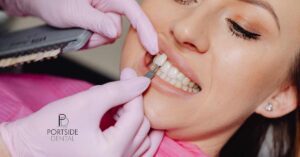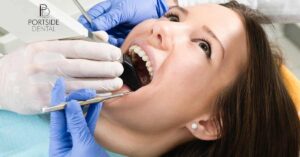Porcelain veneers have become a popular choice for individuals seeking a stunning smile makeover. These thin, custom-made shells are bonded to the front surface of the teeth to correct a variety of cosmetic issues, such as discoloration, misalignment, and chipped teeth.
While porcelain veneers offer remarkable aesthetic benefits, one of the common questions people have is, “How long do porcelain veneers last?” In this comprehensive guide, we’ll look into the longevity of porcelain veneers, factors influencing their lifespan, and tips for maximizing their durability.
What are Porcelain Veneers?
Before diving into the lifespan of porcelain veneers, it’s essential to understand what they are and how they work.
Porcelain veneers are ultra-thin shells made of dental-grade porcelain or ceramic material. Dentists custom-design each veneer to fit the unique contours and color of your teeth, ensuring a natural and harmonious appearance.
Porcelain veneers are primarily used to improve the aesthetics of your smile. They can effectively address various cosmetic concerns, including:
- Stained or discolored teeth.
- Crooked or misaligned teeth.
- Chipped or cracked teeth.
- Gaps between teeth.
- Irregularly shaped teeth.
- Teeth that appear too small or too large.
Schedule your appointment today!!!
These veneers are a minimally invasive option compared to other cosmetic dental procedures like crowns or orthodontic treatment. However, like any dental restoration, they have a finite lifespan.
Related Articles:
Invisalign Vs Braces – Which is better for you?
What is Bruxism? – Teeth Grinding Causes, Symptoms & Treatment
Tooth Extractions in Newport – Procedure, Risks and Aftercare
How Long Do Veneers Last?
The longevity of porcelain veneers can vary from person to person due to several factors. On average, porcelain veneers can last anywhere from 10 to 15 years or even longer with proper care. Here are the key factors that influence how long your veneers will last:
Material Quality: The quality of the porcelain used in making the veneers plays a significant role in their durability. High-quality, well-crafted veneers tend to last longer.
Oral Hygiene: Maintaining good oral hygiene is crucial for the longevity of porcelain veneers. Regular brushing, flossing, and professional cleanings will help prevent plaque buildup, which can lead to veneer damage.

Diet and Habits: Certain dietary choices, such as consuming excessive amounts of acidic or sugary foods and drinks, can weaken the bonding of veneers over time. Similarly, habits like teeth grinding (bruxism) can put undue stress on the veneers and may lead to chipping or cracking.
Accidental Damage: Accidents happen, and physical trauma to the veneers can significantly impact their lifespan. Avoid activities that may increase the risk of damage, such as biting on hard objects or using your teeth as tools.
Proper Dental Care: Regular dental check-ups are essential for monitoring the condition of your veneers. Your dentist can identify any issues early on and provide necessary maintenance or replacements.
Smoking and Vaping: Smoking and Vaping consumption can stain porcelain veneers. Reducing or eliminating these habits can extend the life of your veneers.
Aging: Over time, the natural aging process of your teeth can affect the appearance of your veneers. Some people may choose to replace their veneers for a refreshed look.
Dentist’s Skill: The expertise of your dentist in designing, placing, and maintaining your veneers is critical. A skilled dentist will ensure proper bonding and fit, increasing the veneers’ longevity.

Tip: If you’re seeking porcelain veneers in Newport, look no further than Portside Dental. Our experienced team is dedicated to delivering the finest dental care, ensuring you receive the best possible experience for your smile transformation.
Extending the Lifespan of Porcelain Veneers
To make the most of your investment in porcelain veneers and extend their lifespan, consider these tips:
| Maintain Excellent Oral Hygiene | Brush your teeth at least twice a day, floss daily, and use a non-abrasive fluoride toothpaste. Regular dental check-ups and cleanings are also essential. |
| Avoid Excessive Force | Be cautious while eating hard or crunchy foods, as well as biting on non-food objects like pen caps or ice cubes. Use your teeth for their intended purpose only. |
| Wear a Nightguard | If you have bruxism or clench your teeth at night, wearing a custom-made nightguard can protect your veneers from damage caused by grinding. |
| Limit Stain-Causing Foods and Drinks | Reduce the consumption of staining beverages like coffee, tea, and red wine. If you do indulge, rinse your mouth with water afterward. |
| Quit Smoking | Smoking not only stains veneers but also increases the risk of gum disease and other oral health issues. |
| Regularly Visit Your Dentist | Keep up with your dental appointments to monitor the condition of your veneers. Early detection of any issues can prevent more extensive damage. |
Porcelain veneers offer a remarkable solution for enhancing your smile’s appearance and addressing various cosmetic dental issues. While they are known for their durability and longevity, their lifespan is not indefinite.
Remember that regular consultations with your dentist are essential for monitoring the condition of your veneers and addressing any issues promptly.


You have remarked very interesting points!
ps nice website.Raise blog range